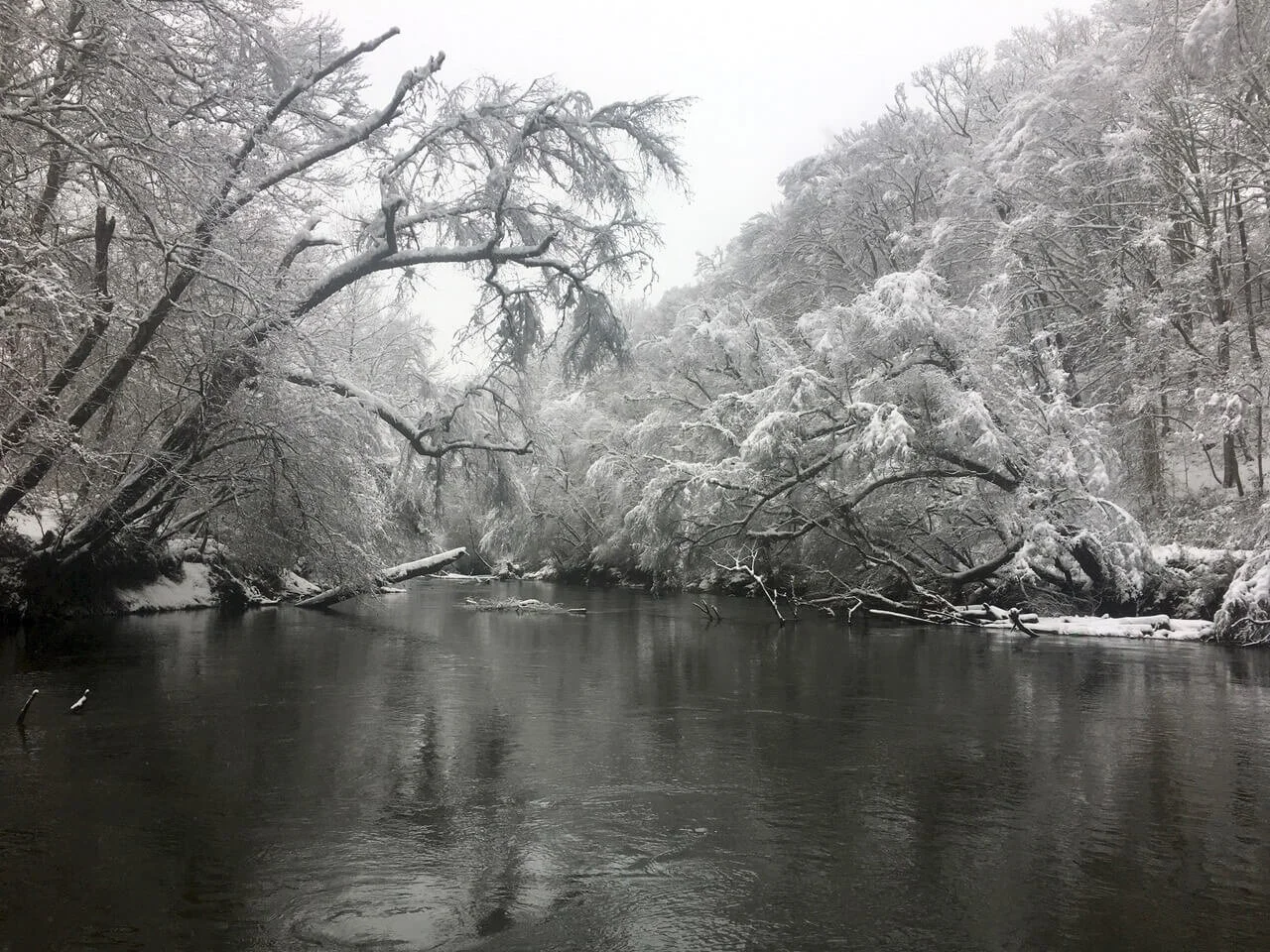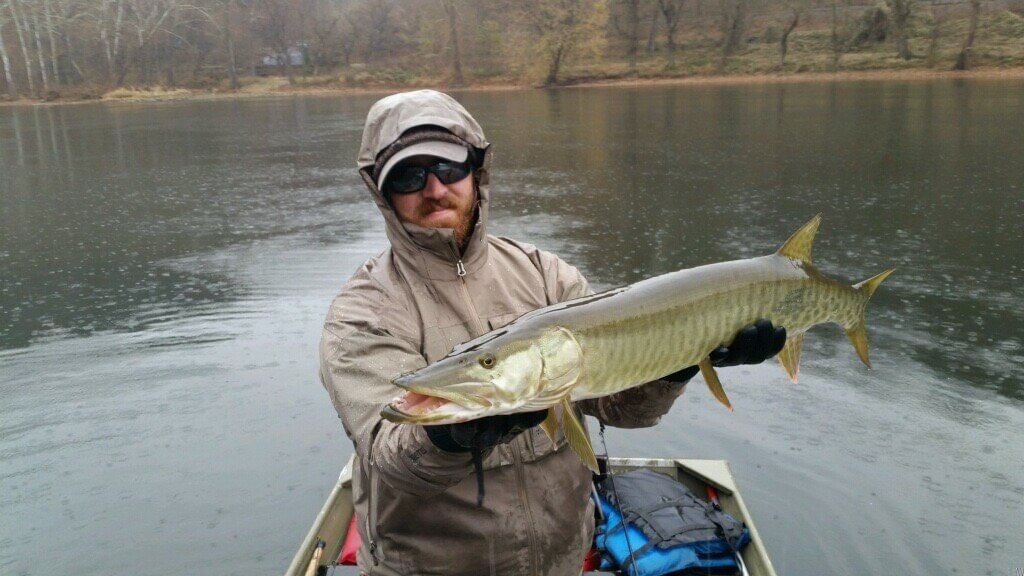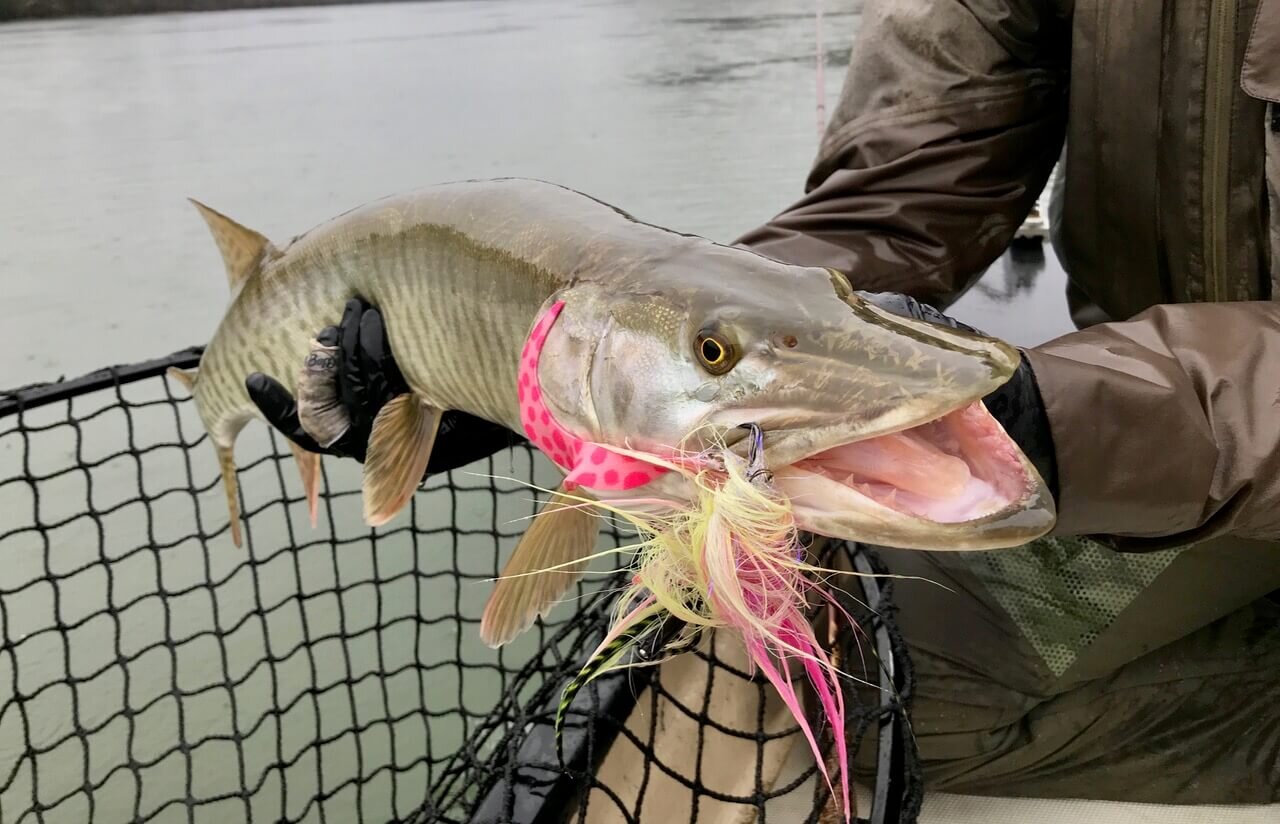Winter Musky fishing in Western NC and East TN
By: Ryan Bednar - Asheville Fly Fishing Company guide
Topics: safety, what to wear, apparel for musky fishing, tactics, fishing report, musky fishing tips
While most of the northern states are nearing the end of their musky season, our southern musky rivers like the French Broad River near Asheville are simply transitioning into a new phase in the area’s nearly year-round season.
As the days get shorter and the nights colder, local baitfish populations begin to consolidate into fewer areas, and the muskies follow right along. Although colder water temperatures slow their metabolism, muskies still feed throughout the winter, and it’s during these colder months that some of the largest fish in our rivers become most susceptible to the dedicated and prepared angler.
Let’s face it, musky fishing isn’t known for being easy, and it certainly doesn’t get any easier in the winter. Being “on your game” is always important when musky fishing and being prepared for the environmental conditions keeps you “in the game” longer, which can ultimately improve your odds for success. While fish are caught on warm and beautiful winter days, there have been many, many more successful days that were cold, wet, and otherwise miserable. Acknowledging and preparing for these cold-weather challenges not only maximizes your changes for catching muskies, it also keeps you more comfortable during the grind, and most importantly, it can keep you safe.
What to wear
Be prepared for much colder than you might expect. You’ll likely be standing or sitting for long hours while fishing, so you’re not going to generate much body heat from movement alone. This may be one of the only times of year that friends fight for the privilege to row the boat. The reality is that some part of your body is going to be wet or damp, and combined with any degree of wind chill, it’s very easy to underestimate the conditions when you’re reading the weather forecast from your smartphone the night before. I always have a waterproof outer layer with me at all times, whether that’s a rain jacket and bibs, or a rain jacket and waders. Even if there’s no precipitation in the forecast, water will always make it’s way into the boat and onto your outerwear simply through the process of stripping fly line and/or reeling a baitcaster, so it’s best if that outer layer is at least water resistant.
Underneath your outer layers, you’ll want to make sure that you wear wool or synthetic thermal layers. Cotton absorbs and holds moisture, so it’s very important to avoid cotton layers during cold weather. Mid-day temperatures can easily be 20 degrees warmer than the morning or late afternoon, so having the ability to shed layers throughout the day is also important to avoid sweating, which could make you cold when the sun dips below the mountains or behind the clouds.
Feet and hands are usually the first to get cold, so I like to bring at least two pairs of gloves, as first pair will eventually get wet. For those very wet and cold days, I also like to have a few pairs of nitrile gloves from the hardware store. While they don’t offer much insulation, they can help keep your hands drier longer, and they provide ample dexterity for handling fly lines and bait casters.
A good pair of warm socks is important as well, but make sure that you have plenty of wiggle room in your shoes, or you’ll reduce circulation and your feet will get cold. Also beware that some synthetic socks can make your feet sweat… that will work against you, so I typically prefer a high quality wool sock designed for fishing or hunting.
Just in case…
If you’ve fished from a boat long enough, you’ve inevitably seen or known someone that has fallen out of the boat. While this usually results in a few laughs when it’s summer, it’s a little less funny when there are icicles hanging from the oarlocks and you’re almost 10 miles from the boat ramp. Fortunately for my good friend (who will remain nameless), I always keep a dry bag with the following items in the boat.
• extra socks
• wool or synthetic long underwear
• fleece pants and shirt
• warm synthetic jacket
• gloves
• wool or fleece beanie
• hand and foot warmer packets
Don’t go out alone. Fishing alone simply isn’t advisable, particularly in winter. Falling out of the boat into frigid waters is a recipe for disaster, especially if no one else is there to help you back into the boat. You’re likely to be wearing lots of extra clothing that can weigh you down and make it very difficult to pull yourself back into the boat while your body and muscles are in shock from the frigid waters. To make matters worse, many of the rivers we fish for muskies tend to have very steep banks lined with rock walls, muddy banks, and fallen trees, so swimming to the bank usually isn’t an easy option either.
Share your fishing plans with your significant other and/or friend. In addition to telling them the name and section of the river or lake you’ll be fishing, be sure to also let them know what time you expect to be off the river. Also have an agreed upon plan of action in the event that you don’t make the check-in time. If you’re going to a particularly remote or inaccessible area, you may also want to tell one of your fishing buddies in addition to your significant other… that way, if your significant other doesn’t hear from you, he/she can contact your fishing buddy who might know that remote area better (and have a boat). In many areas of Western North Carolina and East Tennessee, the mountains prevent a good cell-phone signal, so you may not necessarily want this person to send out the rescue squad if you’ve missed the check-in by an hour, but what if it’s been closer to 3 hours? Needless to say, it’s important to have a game plan and to stick to it.
Little details can make a big difference…
Musky fishing is often a grind, and it can take a toll physically, mentally, and even emotionally. If you find yourself just going through the motions and/or making more bad casts and presentations than good ones, sometimes it’s just best to take a quick break. During those breaks, a hot cup of coffee from a good thermos can go a long way in helping boost your morale and getting you back in the game. Even better, bring a small camp stove on the boat so that you can make a hot lunch. While these might seem like overkill, it’s these types of extra touches that can totally change your mindset and outlook on the day, and indirectly put more muskies in the boat.
Some of my best and most memorable days of musky fishing have been during the winter months, and I feel lucky to live in an area where I’m able to chase these fish all 12 months of the year. The crowds are gone, the rivers are clear and beautiful, and the muskies are still hungry. Be safe, be prepared, and get out there!







